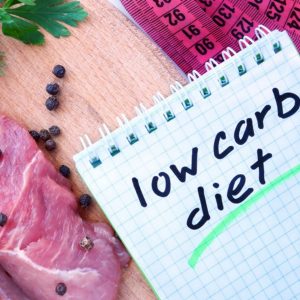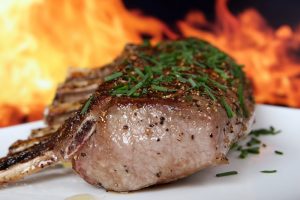Are you thinking about starting a low-carb or ketogentic diet but aren’t sure what you’re getting yourself into? It’s completely natural to have questions about this type of diet that you need answer to before you are willing to commit.
Low carb and ketogenic diets have become popular because, unlike many other diets, they really work for most people who adhere to the rules of low carb/high fat eating. But that probably leaves you with a lot of the typical low-carb diet frequently asked questions.
» You might be interested in the 10 Best Almond Butter Substitutes for Baking & Nut Allergies.
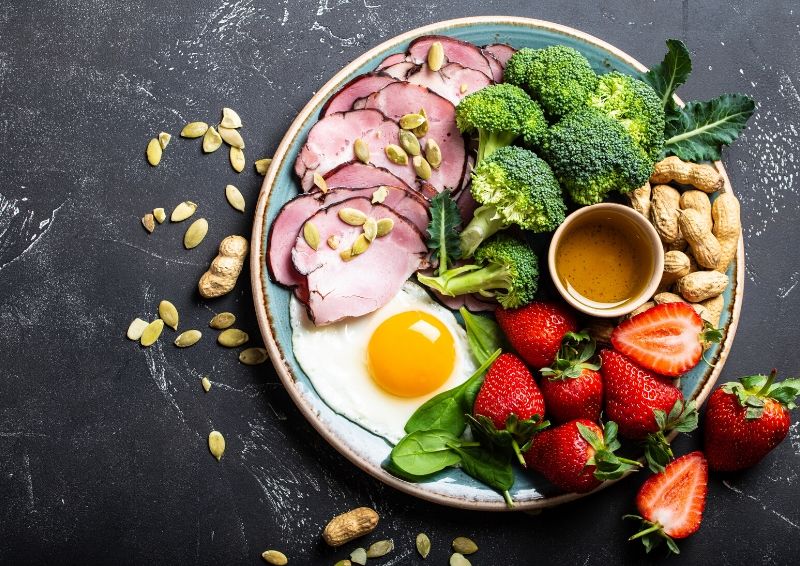
For me, a low-carb diet is the only diet that has ever worked for me – and I’ve tried many. With this diet, I have consist success with weight loss and I feel so much better than I did before.
In order to help you get started the right way, with all of your questions answered, below you will find some of the most frequently asked questions about low-carb eating.
Q: What is a low carb diet?
A low-carb diet is one in which you limit your consumption of carbohydrates to a specified level, usually around 50-150 grams of carbs per day. Instead, you eat whole foods including natural proteins, fats and vegetables.
When you avoid sugar and starches, your blood sugar tends to stabilize and the levels of the fat-storing hormone insulin drop. This helps increases fat burning and makes you feel more satiated, thereby naturally reducing food intake and promoting weight loss.
>>Read more about the low-carb diet – what it is and how to get started.
SEE ALSO…
Q: What is a ketogenic kiet?
The ketogenic diet is a very low-carb, high-fat diet. Carbs are replaced with healthy fats. The reduction of carbs triggers a metabolic state known as lipolysis.
Lipolysis is a process that occurs when the body begins to use fat for energy, instead of carbohydrates obtained from food. The by-products of lipolysis are ketones and ketosis is the secondary process of lipolysis.
Ketosis makes the body burn stored and dietary fat for energy instead of getting its energy from the carbs you eat. Ketosis also turns fat into ketones in the liver that helps supply energy to the brain.
>> Read more about a ketogenic diet to see if it’s right for you.
Pin it for later!

Q: Isn’t low carb just another diet fad?
Absolutely not, it is a lifestyle change. It is not something intended as a temporary fix or a quick weight loss scheme.
There is a lot of scientific research evidence that has shown low-carb eating to be highly effective for sustained weight loss and to provide other possible health benefits.
Q: What are the health benefits of a low carb diet?
There are many benefits from a low-carb and ketogentic diet. Read our full report of the health benefits of this type of diet.
The benefits you will love the most are:
- Low carb eating results in weight loss, which can be very dramatic and very quick.
- Eating low carb eliminates those pesky out of control cravings, stabilizes blood sugar and consequently the appetite.
- Research has shown that reducing carbohydrate consumption and replacing them with protein and healthy fats results in reducing overall calorie consumption naturally and without starvation.
- Reduction in visceral fat – Research has shown that a low carb diet can help to reduce levels of visceral fat specifically rather than the superficial subcutaneous fat.
- Stabilizes blood sugars to possibly prevent and manage type 1 and type 2 diabetes. Since low carb, eating eliminates insulin triggers, (sugars and starches) it is the diet of choice for those with prediabetes or those already diagnosed.
- While a lot of research into low carb eating as it pertains to treating or preventing disease is far from conclusive, a low carb diet certainly results in weight loss and is especially important in regards to metabolic and insulin-related diseases, such as type 2 diabetes and other metabolic syndrome conditions.
- May lower risks for heart disease, diabetes, cancer, and stroke
- The Ketogenic diet is used to treat several types of cancer and to slow the growth of tumors
- The Ketogenic diet is also used to treat traumatic brain injury, epilepsy, Parkinson’s disease, Alzheimer’s disease and polycystic ovary syndrome
- Eating less sugar and lowering insulin levels can help improve acne
- Many people report simply feeling better, including feeling less bloated, and having more energy than when they a high carb diet.

Q: What can I eat on a low carb diet?
There are plenty of great choices, recipes, and combinations of low-carb meals and foods. Read our full guide on the foods you can eat on a low-carb diet.
- Turkey, chicken, red meat, ham, sausage, bacon, organ meat and exotic fowl
- Fish and seafood
- Eggs
- All non-starchy vegetables, including, leafy greens, onions, tomatoes, peppers, mushrooms, olives, etc.
- Butter, heavy cream, full fat sour cream and salad dressings (check labels for carb count)
- Whole full fat unprocessed cheeses, including, cheddar gouda, mozzarella, parmesan and blue cheese in moderation
- Almonds, walnuts, peanuts, nut butters, sunflower seeds, flaxseeds, pumpkin seeds, and chia seeds in moderation
- Extra virgin olive oil, coconut oil and avocado oil
- Avocados (whole or guacamole made from fresh whole avocados)
- Salt, herbs and spices
- No carb sauces like some hot sauce brands, and soy sauce, check labels.
- Berries in moderation
- Drinks: water, unsweetened tea, unsweetened coffee, club soda, no-calorie flavored seltzers, diet soda (be cautious as artificial sweeteners can affect low carb weight loss), herbal tea without added barley or fruit sugars

Q: What carbs are not allowed?
Low carb and ketogenic diets call for the majority of carb intake to be limited to non-starchy vegetables, and small amounts of cheese and full-fat dairy, like sour cream and heavy whipping cream.
No refined sugar, sweets, fruit, rice, pasta, bread, grains, starches, starchy vegetables, flour, and products made with it, or beans are allowed, especially initially in order to trigger ketosis.
Slow integration of some carb rich foods, like nuts, berries, and even beans can take place as you progress through the diet and reach your goals. How much and what carbs you can have depends on your individual weight loss progress and how those carbs effect it.
Q: How many carbs can I eat?
This really depends on the particular plan. The strictest recommendation is 20 grams or less, as is the case with the ketogenic diet. Overall, 50 grams or less daily is recommended.
Additionally, physical activity matters, meaning the more active you are, the more carbs you can eat, but keep in mind the carb sources should still be vegetables, nuts, berries and possibly beans in moderation.
If you are thrown out of ketosis or weight loss stalls, then carb intake will have to be altered.

Q: Do I have to count calories?
Low carb diets advocate eating to satisfaction, and there is no need to count calories. When you eliminate unhealthy carbs from your diet, you also get rid of out-of-control cravings, you stabilize blood sugar and consequently the appetite.
Research has shown that reducing carbohydrates and replacing them with protein and healthy fats results in reducing overall calorie consumption naturally and without starvation.
Many people report having to remember to eat by a clock because they simply do not feel out of control hunger as they did before cutting out carbs.
Q: How can it be healthy to cut out carbs from my diet? I want to lose some weight but cutting out something as important to our bodies as carbs scares me.
Remember that a low carb diet allows non-starchy vegetables, which are the healthiest carbs. It is the unhealthy carbs that are cut out, like refined sugar and sweets that do nothing but harm the body, along with grains, like rice and pasta, which many experts believe we can live without.
This includes whole grains, which are not much different from sugar in their ability to release glucose and often have a higher glycemic index than sugary foods, which means they cause more of an insulin response in the body.
In fact, whole grains lack the nutrients or longevity of fats and proteins, and have been strongly associated with autoimmune diseases.

Another important factor is that you eliminate carbs, but increase intake of healthy fats. Fats tend to get a bad rap in the food chain when, in fact, some of them are actually very good for you.
There are many essential nutrients we get from fatty foods, such as avocado, meats, butter, cheese, coconut, and olive oils, not the least of which is energy and the subsequent benefit of fat-burning ketosis.
Many studies have shown that low-carb diets are more effective in causing weight loss, decreasing risks for heart disease, improving metabolic health, and the lipid profile than low fat diets.
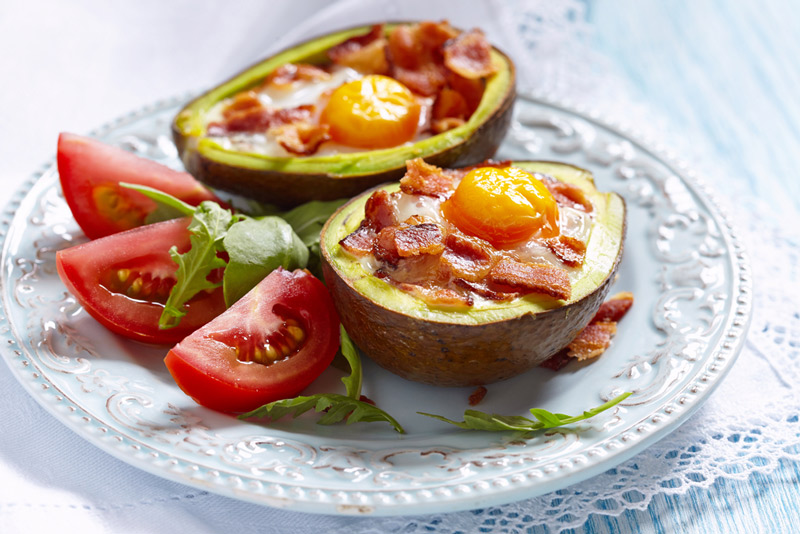
Q: How will my body run if I cut carbohydrates from my diet? Aren’t carbs what fuel us?
Yes, carbohydrates are a source of fuel for the body, but they are not the only ones. As a matter of fact, evidence shows that our bodies are great adapters and that they actually run better when burning fat as opposed to burning carbs, a process known as ketosis.
Your body also has an almost endless supply of fat to burn as body fuel but only a limited supply of carb-produced glycogen. Many people also don’t realize that there is a natural process in the body that turns protein into glycogen body fuel called gluconeogenesis.
So not only will you get plenty of body fuel when lowering your carb intake, this is exactly what allows you to lose weight and turns your body into a fat-burning machine.
Q: I have read that ketosis is extremely dangerous. Is this fact or myth?
Ketosis is often confused with ketoacidosis. Ketosis is a perfectly harmless, helpful, and natural metabolic process, while ketoacidosis is a dangerous condition that happens in uncontrolled diabetes.
Many people are instructed by doctors to go on a ketogenic diet for certain conditions. As such, it is a perfectly safe diet, in measure. Cutting out all carbs from your diet, however, can be dangerous.

Q: Are there any side effects to cutting out carbs?
Some people experience digestion and gastro problems, but this common side effect typically goes away after about four weeks. Eating more high-fiber vegetables, like leafy greens and broccoli helps, and magnesium supplements can alleviate constipation.
There are a few other reported side effects of a ketogenic diet, like the keto flu, the keto rash, and bad breath.
Q: Will I ever be able to eat carbs or sugar again?
When following the ketogenic diet, it is very important to be strict in the elimination of carbs initially, to allow the body to fully enter ketosis. As you reach your goals, be it weigh loss or regaining your health, you can indulge on occasion, but then return to the diet.
You might find it helpful to slowly integrate certain carbs back into your diet, while tracking its effect on your weight, allowing you to reach your goal weight and maintain it by finding your ideal carb balance.
As with any healthy eating strategy, moderation is always key. Additionally, many people who sustain a low carb lifestyle for the long term find that when they do eat sugar or sugary foods they simply do not tolerate them or even enjoy them as they used to, either because the taste is so strong and overwhelming or because they just simply feel better without it.

Q: Won’t the high fat intake cause high cholesterol?
Evidence suggests the opposite is true. Low-carb eating has an edge over low-fat diets for improving good HDL cholesterol levels over the long term as shown by one of the longest studies done on the subject (but not the only one), funded by the National Institutes of Health (published in the journal, Annals of Internal Medicine).
Subjects ate either a low carb plan or a low fat plan for two years and both groups lost about 15 pounds, or 7% of their body weight. The difference between the two groups was that those who ate low carb had a significant increase in the good HDL cholesterol levels as compared to those who ate a low fat diet.
Several other studies have also shown low carb to be more effective than low fat in actual pounds lost and in reducing risk factors for heart disease.

Q: I know I will miss carbs, and my old sugary favorites. What can I do?
Of course there is an adjustment period, and there may be struggles, but the truth is, once you kick the sugar habit, your body and mind will adjust and you likely won’t crave those foods as much anymore.
But being on a low-carb or keto diet doesn’t mean you can never have a sweet treat again. In fact, there are many versions of desserts, like this chocolate mousse and these butter cookies, that use almond flour and sugar substitutes and are perfectly acceptable on a low-carb diet.
>> See our full list of keto and low-carb desserts.
Q: Are headaches and dizziness a side effect of a low-carb diet?
Headaches and dizziness can be a common occurrence that are caused by the kidneys excreting salt more rapidly as a result of ketosis.
The body is getting rid of excess water and salt, since a low carb is natural diuretic. This simply means you need to eat more salt and drink more water. Extra salt intake also helps solve the problem of the kidneys compensating for loss of salt by releasing potassium, which is good for muscle mass.
To counteract this, you can drink beverages with electrolytes or make sure you liberally salt your food.
Generally the headaches and dizziness subside after the first few weeks on the diet. I actually never experienced either symptom.
Q: Will I feel tired and weak?
I’ve actually on heard the opposite and you will likely experience more energy and feel less tired while on a low-carb diet.
If you do feel weak and tired, you might consider increasing your electrolytes or increasing your carb intake by a few grams per day.
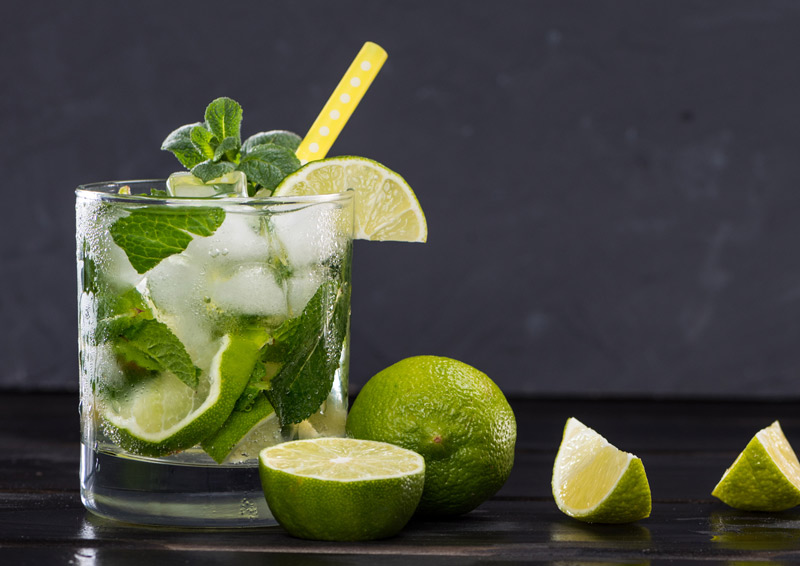
Q: Will I have to give up alcohol when eating low carb?
The body burns alcohol for fuel when alcohol is available, and this means that while it’s burning the alcohol it will not burn fat. However, drinking alcohol will not stop weight loss altogether, it will just postpone it.
Because the body does not store pure alcohol as glycogen, it can immediately return to lipolysis once the alcohol is metabolized. In some people, alcohol can interfere with weight loss by increasing yeast-related symptoms. If this is not a problem for you, then you probably only want to include very moderate amounts of alcohol, if any.
It is important to choose the right type of alcohol, meaning that you have to be careful that what you are drinking is not full of carbs or sugar. Beer is definitely a no-no, as it is basically liquid bread and you cannot have sugar-filled cocktails, such as a Margaritas or Pina Coladas.
Stick with pure spirits like whiskey and vodka, which have zero carbs, and also wine, which has a low amount of carbs. And above all, practice moderation.
Q: Are artificial sweeteners allowed and do they have ill effects on your long-term health?
As there are many artificial sweeteners on the market, you should carefully research them before you choose to use one. There is controversy over the safety of some artificial sweeteners, but the debate rages on, so we don’t want to make any recommendations. This has to be your own decision.
We use natural sweeteners like Erythritol and Monk Fruit rather than artificial sweeteners.

Learn more about low-carb sweeteners and conversion here.
Q: Is there a risk of muscle loss on low-carb diets?
Many diets pose this risk, but the high protein and ketone levels help minimize this problem.
It is always recommended for anyone to participate in regular muscle and strength training as part of an overall healthy lifestyle.
Q: I’ve heard low carb eating can cause urine to smell fruity? Is this true?
It happens, but it’s not a problem. It’s just the result of the excretion of byproducts created during ketosis.
Q: Is a low carb diet good for everyone?
Low carb diets, like the ketogenic and Atkins plans, are ideal for those who want to lose weight, are struggling with diabetes or have prediabetes and want to reduce risks for an actual diagnoses of type 2 diabetes, and also for those looking to improve their metabolic health.
Of course, it will not work for everyone, and is not recommended for everyone. You should always ask your doctor before starting any new diet.

Q: What is Low-Carb Cycling?
A cyclical low-carb diet is one in which you adhere to strict low-carb eating for 5 or 6 days of the week, followed by a day or two of higher-carb eating.
The cyclical ketogenic diet supports intense workouts, bodybuilders and athletes by providing them with the carbs they need to perform, and is a strict regimen with carefully measured carb intake, well planned out depletion workouts along with strict adherence to very low carb eating for most of the week.
It’s usually more beneficial not to carb cycle if you’re not an athlete.
Final Thoughts
Hopefully, these questions have helped clear up some of the common myths, rumors, and misconceptions about low-carb eating so you can make an informed choice.
Read More About a Low-Carb Lifestyle
Pin it! If you liked this recipe please share it on Pinterest so others can find it too. We always appreciate your support! Follow us on Pinterest and Facebook to keep up on what we’re cooking up.
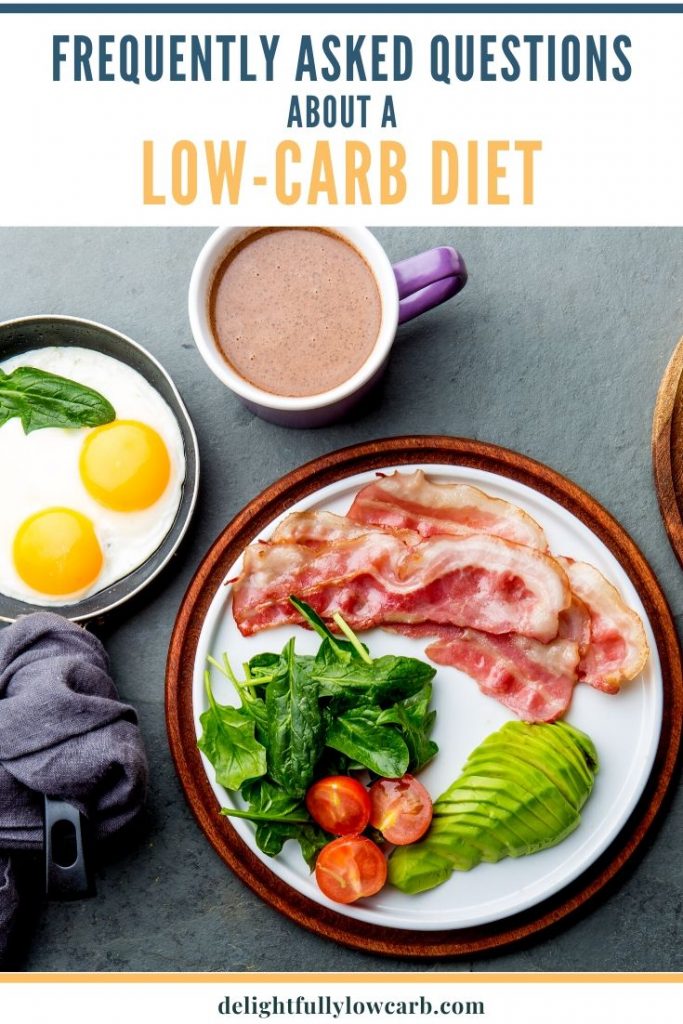

Laura is dedicated to a low-carb lifestyle after losing 52 pounds on the keto diet. As many of us do, she struggles with her weight and has found that one of the only diet lifestyles that allows her to maintain a healthy weight is a low-carb diet. She shares her favorite low-carb recipes here that are both easy to make and full of flavor, so you don’t even miss the carbs.

